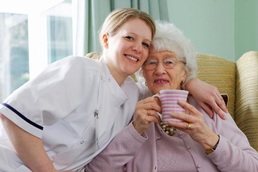Care homes advised to read up on the prevention and control of infection

Guidance on how to safeguard care home residents from infection has been published by the Department of Health.
The publication ‘Prevention and control of infection in care homes’ has been compiled to provide ‘clear information’ on standards for providers to adhere to, with residential facilities being particularly vulnerable to diseases like the norovirus, because of the close proximity of residents.
The Department of Health outlines that: 'The steps taken in care homes to protect residents and staff from infection represent an important element in the quality of care, particularly as some infections have the capacity to spread within environments where susceptible people share eating and living accommodation. It is also important to be aware of the possibility of infection in residents and for care workers to identify these promptly.
'Infections acquired in care homes may be serious and, in some cases, life-threatening. These may worsen underlying medical conditions and adversely affect recovery. Infections may be caused by organisms resistant to antibiotics and the high media profile they generate may alarm residents, their relatives and carers.'
This winter has seen a record number of norovirus outbreaks – the infection also known as ‘the winter vomiting bug’ – in the UK, with the Health Protection Agency recording 63 per cent more cases than last year, which is particularly dangerous for older people who may already have sensitive physical health conditions.
Norovirus expert from the Health Protection Agency (HPA), John Harris, comments: “There have been reports in the media of people with symptoms of norovirus attending their local hospital but we would urge people not to do this. If you think you may have the illness then it is important to stay away from any healthcare facility and care homes to avoid spreading it to people who may have underlying health conditions and already be vulnerable. If you need advice it is best to phone NHS Direct or your doctor.”
To read the Department’s guidelines in full go to: www.wp.dh.gov.uk/publications/files/2013/02/Care-home-resource-11-February-2013.pdf
Latest News
 29-Jul-24
Dementia Bus gives carehome.co.uk staff insight into life with dementia
29-Jul-24
Dementia Bus gives carehome.co.uk staff insight into life with dementia
 01-Mar-24
Find out the top care homes in 2024
01-Mar-24
Find out the top care homes in 2024
 21-Mar-23
UK's top care homes in 2023 revealed
21-Mar-23
UK's top care homes in 2023 revealed
 03-Jan-23
carehome.co.uk launches free care helpline
03-Jan-23
carehome.co.uk launches free care helpline
 13-Dec-22
5 mins with Emily Whitehurst, chief operating officer for Constantia Healthcare
13-Dec-22
5 mins with Emily Whitehurst, chief operating officer for Constantia Healthcare